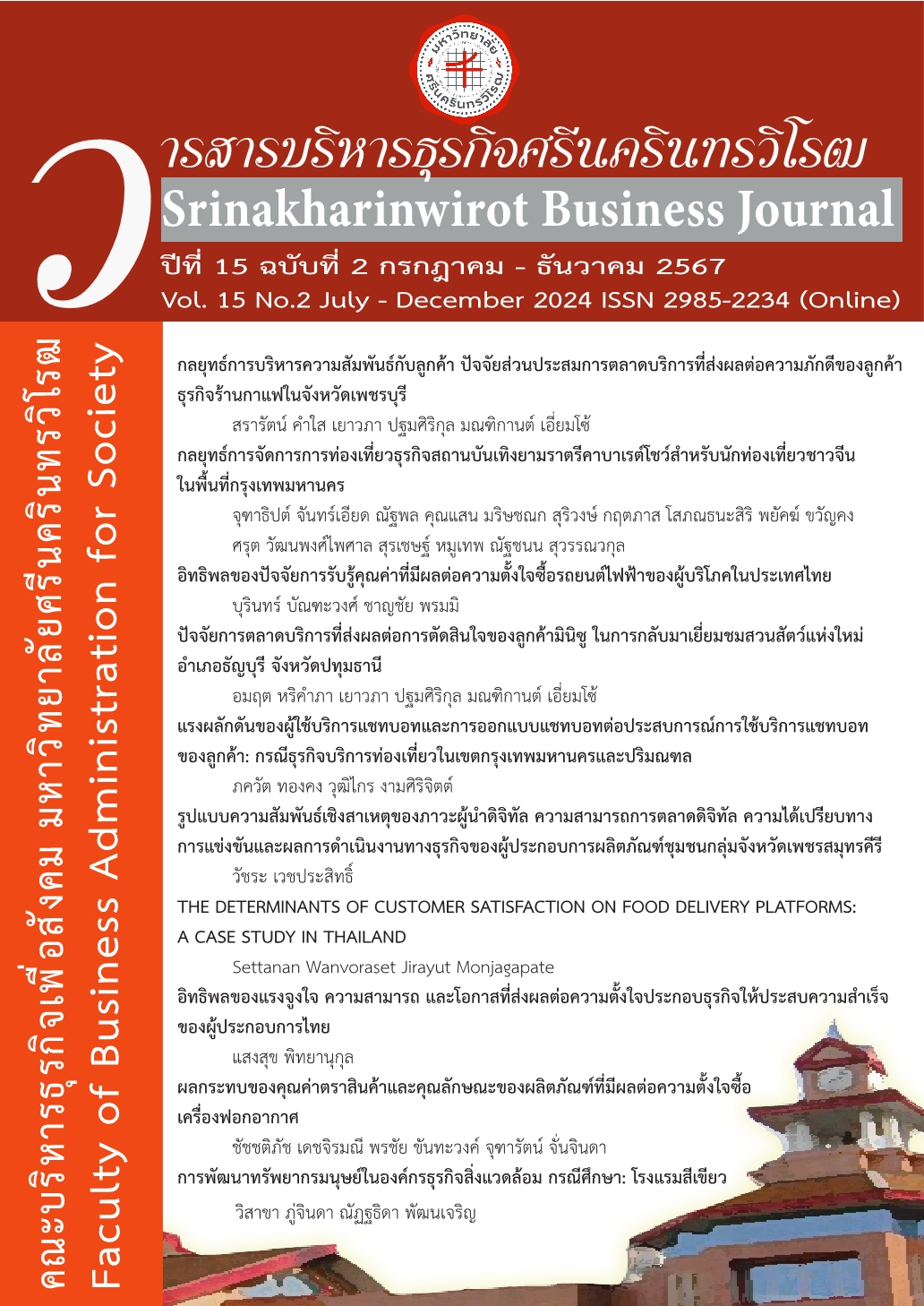THE DEVELOPMENT OF HUMAN RESOURCES IN BUSINESS ORGANIZATIONS: A CASE STUDY OF GREEN HOTELS
การพัฒนาทรัพยากรมนุษย์ในองค์กรธุรกิจสิ่งแวดล้อม กรณีศึกษา: โรงแรมสีเขียว
Keywords:
การพัฒนาทรัพยากรมนุษย์, องค์กรธุรกิจสิ่งแวดล้อม, เป็นมิตรต่อสิ่งแวดล้อม, Human resource development, Environmental business organization and green hotelAbstract
The study of Human Resources Development in Business Organizations: a case study of Green Hotels, aims to explore the trend in human resource development in green hotel business to investigate environmental management in the green hotel business and then to propose guidelines for the human resource development of green hotels based on the BCG Model. The research involves qualitative data analysis derived from interviews with representatives from four green hotels: business operators, human resource managers, hotel managers, and environmental officers with purposive selection method, along with quantitative data analysis from a survey conducted with 139 hotel staff using random sampling. The data were analyzed using SPSS, applying descriptive statistics. The findings indicate that the trend in human resource development emphasizes the characteristics of personnel, as excellent service is essential for ensuring customer satisfaction and repeat customer. Given with the diversity of staff, it is crucial to address the concerns of employees, which helps mitigate issues between service staff and clients. Employees must be attentive and aware of resource usage and environmental considerations in hotel operations, aligning with the environmental management practices of green hotels. However, there is still a lack of environmental awareness among staff, who need to focus on complying with the green hotel policies, such as implementing the 3Rs, energy conservation, and water saving, which also serve to reduce hotel operational costs. Moreover, human resources, being vital for organizational development, require enhancements in knowledge, understanding, and environmental awareness through experiential learning, promoting lifelong learning, emphasizing collaboration, fostering a culture of open learning, and developing creative thinking alongside essential skills for the future. Additionally, organizational policies and support from the government such as knowledge, technology, and innovations in environmental management for green hotels have a significant role in developing staff skills and competencies. Therefore, the development of human resources in green hotel business organizations emphasizes utilizing natural resources in a way that minimizes environmental impact while enabling personnel to adapt to the changes in the economy, society, environment, and advancements in global technologyDownloads
References
กัลยา วาณิชย์บัญชา. (2543). การใช้ SPSS for Windows.ในการวิเคราะห์ข้อมูล. โรงพิมพ์ ห้างหุ้นส่วนจำกัด ซี เค แอนด์ เอส โฟโต้สตูดิโอ.
กรมการท่องเที่ยว. (2560). แผนยุทธศาสตร์การพัฒนาแหล่งท่องเที่ยวของประเทศ พ.ศ. 2560 – 2564. บริษัท พีดับบลิว พริ้นติ้ง จำกัด.
กรมส่งเสริมคุณภาพสิ่งแวดล้อม. (2564). Green Hotel with BCG คู่มือโรงแรมที่เป็นมิตรกับสิ่งแวดล้อม (พิมพ์ครั้งที่ 1). สำนักส่งเสริมการมีส่วนร่วมของประชาชน กรมส่งเสริมคุณภาพสิ่งแวดล้อม และบริษัท แกรนด์เทค จำกัด.
ธนาคารแห่งประเทศไทย. (13 มิถุนายน 2566). การท่องเที่ยวไทยฟื้นตัวอย่างไรในเชิงพื้นที่. สำนักพิมพ์กรุงเทพธุรกิจ. https://www.bot.or.th/th/research-and-publications/article/chaengsibia/ article-2023jun13.html
ธีรวี ทองเจือ และปรีดี ทุมเมฆ. (2560). แนวทางการพัฒนาทรัพยากรมนุษย์ในศตวรรษที่ 21: มิติด้านการศึกษา. วารสารสันติศึกษาปริทรรศน์ มจร, 5(3). https://so03.tci-thaijo.org/index.php/journal-peace/article/view/93420
ธัญพิมล วสยางกูร และจารุวรรณ พลอยดวงรัตน์. (2565). การบริหารทรัพยากรมนุษย์ในยุคการเปลี่ยนแปลงพลิกผันด้วยการสร้างองค์กรแห่งความคล่องตัว. วารสารสมาคมพัฒนาวิชาชีพการบริหารการศึกษาแห่งประเทศไทย, 4(4). https://so04.tci-thaijo.org/index.php/JAPDEAT/article/view/252209
นวัสนันท์ วงศ์ประสิทธิ์ และวิชิต แสงสว่าง. (ม.ป.ป.). การศึกษาแนวโน้มการจัดการทรัพยากรมนุษย์ของไทยในอนาคต. ฉะเชิงเทรา: มหาวิทยาลัยราชภัฏราชนครินทร์.
นิศาชล จันทรานภาสวัสดิ์, วรวรรธน์ วรกุลพัชรวัฒน์ และวิพล โชติวรรณชูสกุล. (2562). การบริหารทรัพยากรมนุษย์เพื่อส่งเสริมการท่องเที่ยวของประเทศไทย. วารสารวิทยาลัยดุสิตธานี, 13(2). https://so01.tci-thaijo.org/index.php/journaldtc/article/view/241084
เนตร์ภัณณา ยาวิราช. (2560). การจัดการเปลี่ยนแปลงและการพัฒนาองค์การ: Managing Change and Organization Development (พิมพ์ครั้งที่ 2). โรงพิมพ์บริษัท ทริปเพิ้ล กรุ๊ป จำกัด.
พชร สันทัด. (2562). การพัฒนาทรัพยากรมนุษย์เพื่อการทำงานในยุคประเทศไทย 4.0. วารสารอาชญากรรมและความปลอดภัย, 1(1). https://so06.tci-thaijo.org/index.php/jcs_rpca/article/view/244903
พรพิมล ศรีธเรศ และแสงแข บุญศิริ. (2562). การพัฒนาทรัพยากรมนุษย์เพื่อสร้างการปรับเปลี่ยนพฤติกรรมเพื่อสิ่งแวดล้อมของพนักงานโรงแรมสีเขียว ในประเทศไทย. วารสารสันติศึกษาปริทรรศน์ มจร. 7(4). https://so03.tci-thaijo.org/index.php/journal-peace/article/view/184893
วทัญญู สุวรรณเศรษฐ และวรรณวิชนี ถนอมชาติ. (2564). แนวโน้มการปรับตัวขององค์การธุรกิจและหน้าที่ของฝ่ายพัฒนาทรัพยากรมนุษย์ในยุคความปกติถัดไป. RMUTT Global Business and Economics Review, 16(1). https://so03.tci-thaijo.org/index.php/RMUTT-Gber/article/view/252999
วุทธิชัย ลิ้มอรุโณทัย. (2562). ตัวแบบการจัดการทรัพยากรมนุษย์เพื่อพัฒนาองค์การอย่างยั่งยืนกรณี ศึกษา วิสาหกิจขนาดกลางและขนาดย่อม ในพื้นที่กรุงเทพฯและปริมณฑล. Veridian E-Journal, Silpakorn University, 12(5). https://he02.tci-thaijo.org/index.php/Veridian-E-Journal/article/view/175915
วัชระ เวชประสิทธิ์. (2564). รูปแบบกลยุทธ์การจัดการทรัพยากรมนุษย์สีเขียวที่ส่งผลต่อผลการดำเนินงานอย่างยั่งยืนของสถานประกอบการที่เป็นมิตรต่อสิ่งแวดล้อมในประเทศไทย. วารสารบริหารธุรกิจศรีนครินทรวิโรฒ, 12(1). https://ejournals.swu.ac.th/index.php/MBASBJ/article/view/13954
สราวรรณ์ เรืองกัลปวงศ์ และอรรนพ เรืองกัลปวงศ์. (2565). การจัดการทรัพยากรมนุษย์ภายใต้สภาพสังคมใหม่ (Next Normal). วารสารมนุษยศาสตร์และสังคมศาสตร์ มมร วิทยาเขตอีสาน, 3(2). https://so06.tci-thaijo.org/index.php/jhsmbuisc/article/view/256123
สำนักงานสถิติแห่งชาติ. (2566). การสำรวจที่พักแรม พ.ศ. 2565 (พิมพ์ครั้งที่ 1). กองสถิติพยากรณ์ สำนักงานสถิติแห่งชาติ.
Dubravska, M. and Solankova, E. (2019). Recent Trends in Human Resources Management in Selected Industry in Slovakia and the Czech Republic. Procedia Economics and Finance, 26. https://www.sciencedirect.com/ science/article/pii/ S2212567115009247
Elshaer, I.A., Sobaih, A.E.E., Aliedan, M. and Azazz, A.M.S. (2021). The Effect of Green Human Resource Management on Environmental Performance in Small Tourism Enterprises: Mediating Role of Pro-Environmental Behaviors. Sustainability, 13(4). https://www.mdpi.com/ 2071-1050/ 13/ 4/ 1956
Mir, A.A. and Iqbal, S. (2016). Human resource development (HRD) for sustainable tourism: a descriptive study. International Education and Research Journal, 2(5). https://ierj.in/ journal/index.php/ierj/article/view/258
Rekha, Y.C., and Reddy, S.S. (2013). Human Resource Development in Tourism Industry. SSRN Electronic Journal. https://papers.ssrn.com/ sol3/ papers.cfm?abstract_id=2365729
Downloads
Published
How to Cite
Issue
Section
License
Copyright (c) 2024 วารสารบริหารธุรกิจศรีนครินทรวิโรฒ: Srinakharinwirot Business Journal

This work is licensed under a Creative Commons Attribution-NonCommercial-NoDerivatives 4.0 International License.
วารสารบริหารธุรกิจศรีนครินทรวิโรฒ ยินดีรับบทความวิจัยและบทความทางวิชาการด้านบริหารธุรกิจ เพื่อพิจารณาตีพิมพ์เผยแพร่ในวารสาร ซึ่งทัศนะและข้อคิดเห็นใดๆ ในวารสารฯ ถือเป็นความคิดเห็นและความรับผิดชอบโดยตรงของผู้เขียน มิใช่เป็นความคิดเห็นและความรับผิดชอบใดๆ ของคณะบริหารธุรกิจเพื่อสังคม มหาวิทยาลัยศรีนครินทรวิโรฒ ผู้ประสงค์จะนำบทความหรือบทวิจารณ์ใดๆ ไปเผยแพร่ จะต้องได้รับการอนุญาตจากวารสารเป็นลายลักษณ์อักษร ลิขสิทธิ์บทความที่เผยแพร่ทั้งหมดเป็นของวารสารบริหารธุรกิจศรีนครินทรวิโรฒ






